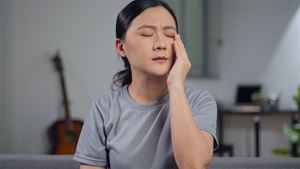
No matter the time of day or where you are, having a temporary eye twitch is an annoying inconvenience.
Involuntary eye twitches, clinically known as eyelid myokymia, are uncontrollable spasms of the orbicularis oculi muscle. Those spasms show up as tiny continuous contractions of the upper or lower eyelid. Women are shown to experience eye twitching more often than men, according to researchers.
Kyle Williams, MD, is an ophthalmologist with Rochester Regional Health Eye Care and sheds light on the reasons behind those pesky eye twitches, some methods of controlling them, and how to prevent them in the future.
Most people who develop an eye twitch experience it sporadically. These involuntary movements tend to be brought on by environmental factors, including:
While rare, some medications can trigger eye twitches. If you are unsure whether eye twitches might be related to medication use, check the prescription bottle for a list of side effects and ask your primary care provider for advice.
If eye twitches start to happen on a more regular basis over the course of several weeks, it could be an indication of a chronic condition such as essential blepharospasm or hemifacial spasm.
“Facial muscle spasms that last longer than two weeks warrant a consultation with an eye doctor,” Dr. Williams said. “Schedule an appointment with an ophthalmologist so you can get a trusted answer and find a proper treatment as needed.”
For the most part, the answer to stopping an acute eye twitch immediately is just to wait it out. Using eye drops to keep your eyes moist might help to relieve the muscle spasms slightly.
The best way to prevent some of the environmental factors that contribute to eye twitches, such as stress, anxiety, and fatigue, is to rest your body. Research shows allowing your body to reset itself and slow down can help with eye twitches, as well as your overall health.
Decreasing caffeine and alcohol intake can also reduce the likelihood of eye twitches recurring.
“Small lifestyle changes may seem trivial, but they can lead to plenty of healthy results – like lowering the risk of developing eye twitches or other minor health concerns,” Dr. Williams said.
As previously mentioned, eye twitches that persist for more than two weeks should be observed by an ophthalmologist to determine if there is a more serious underlying issue.
Other symptoms that need to be looked at by an eye doctor include:
“Eye twitches are more noticeable to the person having them than others around them,” Dr. Williams said. “Other people may not point them out. If you recognize that something is not quite right with your eyesight, reach out to an eye doctor as soon as you can and schedule an appointment.”
